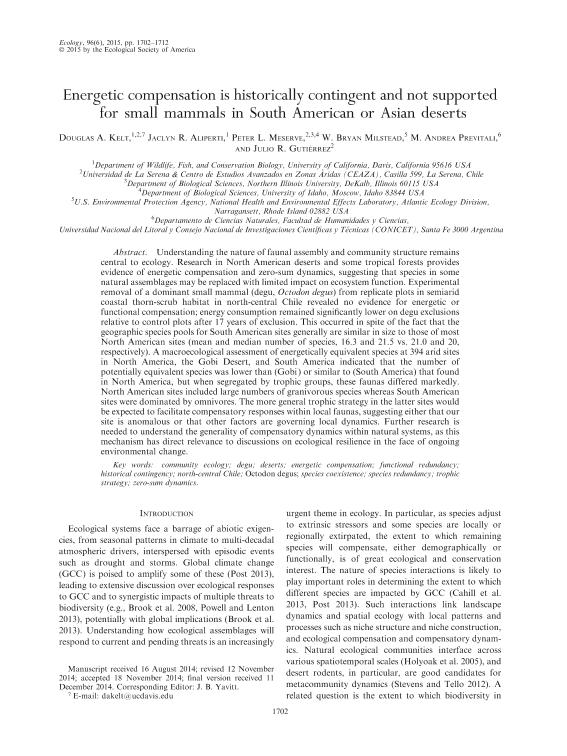Artículo
Energetic compensation is historically contingent, and is not supported for small mammals in South American or Asian deserts
Kelt, Douglas A.; Aliperti, Jaclyn R.; Meserve, Peter L.; Milstead, W. Bryan; Previtali, Maria Andrea ; Gutiérrez, Julio R.
; Gutiérrez, Julio R.
 ; Gutiérrez, Julio R.
; Gutiérrez, Julio R.
Fecha de publicación:
06/2015
Editorial:
Ecological Society of America
Revista:
Ecology
ISSN:
0012-9658
Idioma:
Inglés
Tipo de recurso:
Artículo publicado
Clasificación temática:
Resumen
Understanding the nature of faunal assembly and community structure remains central to ecology. Research in North American deserts and some tropical forests provides evidence of energetic compensation and zero-sum dynamics, suggesting that species in some natural assemblages may be replaced with limited impact on ecosystem function. Experimental removal of a dominant small mammal (degu, Octodon degus) from replicate plots in semiarid coastal thorn-scrub habitat in north-central Chile revealed no evidence for energetic or functional compensation; energy consumption remained significantly lower on degu exclusions relative to control plots after 17 years of exclusion. This occurred in spite of the fact that the geographic species pools for South American sites generally are similar in size to those of most North American sites (mean and median number of species, 16.3 and 21.5 vs. 21.0 and 20, respectively). A macroecological assessment of energetically equivalent species at 394 arid sites in North America, the Gobi Desert, and South America indicated that the number of potentially equivalent species was lower than (Gobi) or similar to (South America) that found in North America, but when segregated by trophic groups, these faunas differed markedly. North American sites included large numbers of granivorous species whereas South American sites were dominated by omnivores. The more general trophic strategy in the latter sites would be expected to facilitate compensatory responses within local faunas, suggesting either that our site is anomalous or that other factors are governing local dynamics. Further research is needed to understand the generality of compensatory dynamics within natural systems, as this mechanism has direct relevance to discussions on ecological resilience in the face of ongoing environmental change.
Archivos asociados
Licencia
Identificadores
Colecciones
Articulos(CCT - SANTA FE)
Articulos de CTRO.CIENTIFICO TECNOL.CONICET - SANTA FE
Articulos de CTRO.CIENTIFICO TECNOL.CONICET - SANTA FE
Citación
Kelt, Douglas A.; Aliperti, Jaclyn R.; Meserve, Peter L.; Milstead, W. Bryan; Previtali, Maria Andrea; et al.; Energetic compensation is historically contingent, and is not supported for small mammals in South American or Asian deserts; Ecological Society of America; Ecology; 96; 6; 6-2015; 1702-1712
Compartir
Altmétricas



